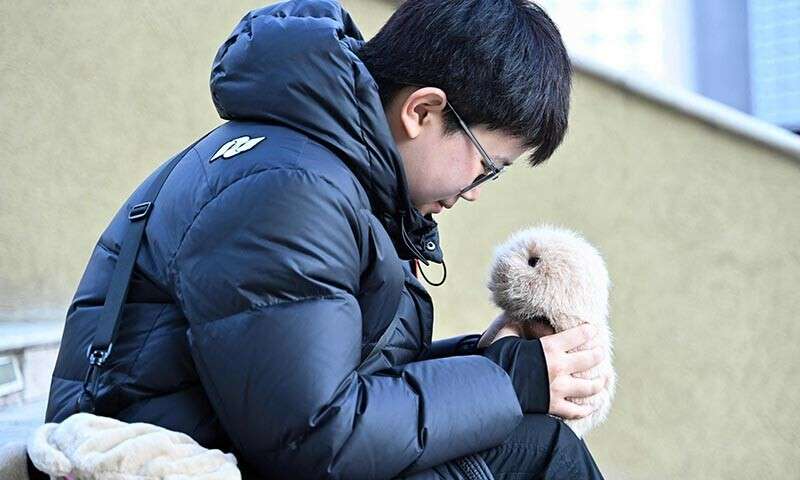Introduction: The Rise of AI Companions in China
In the bustling streets of Beijing, a new kind of companionship is becoming increasingly popular among young people. AI-powered robots, known as “smart pets,” are offering emotional support to those facing social isolation and mental health struggles. One such individual is 19-year-old Zhang Yachun, who has found solace in her AI pet, BooBoo. The robot, powered by artificial intelligence, serves as a constant companion, providing comfort and companionship without the complexities of human relationships.
Zhang’s experience reflects a broader trend in China, where AI pets are gaining popularity, especially among the younger generation. These technological companions are helping users navigate feelings of loneliness, anxiety, and social isolation in an increasingly digital world.
The Emotional Connection with AI Pets
Zhang, who has long struggled with anxiety related to school and work, shares that her life has become more manageable since she purchased BooBoo. “I feel like I now have someone to share the happy times with,” she says. Her relationship with her AI pet, named “Aluo,” is marked by emotional interactions that soothe her mind, providing her with a sense of connection.
The companionship provided by AI pets, like BooBoo, offers a sense of comfort and emotional relief, something that traditional pets or human friends may not always be able to provide. These robots are designed to engage with their owners through various interactive behaviors such as chirping, nodding, and responding to voice commands. For Zhang, her AI pet fills a void that was once occupied by human relationships, helping her combat loneliness and manage her anxiety.
How AI Pets Work
The technology behind AI pets like BooBoo is rooted in advanced artificial intelligence systems that allow the robots to simulate emotions, respond to voice cues, and interact with their owners. These robots are designed with emotional intelligence in mind, mimicking the behaviors of real pets or friends. The smart pet, which resembles a soft, furry animal (often resembling a guinea pig or small dog), has sensors that enable it to react to touch, sound, and even the tone of the user’s voice.
In Zhang’s case, BooBoo—designed by Hangzhou Genmoor Technology—uses AI to deliver soothing sounds and engage in empathetic interactions. For instance, BooBoo’s chirps are calming, offering Zhang the reassurance that she is not alone in her space. The device, which costs up to 1,400 yuan ($190), is affordable for many young people in China and provides an accessible emotional support tool.
The Growing Popularity of AI Pets in China
As social isolation becomes a growing concern among younger generations in China, many are turning to AI pets as a solution. The country’s digital culture, with its emphasis on online interactions and social media, has made it difficult for some to form deep, lasting relationships. In this context, AI pets offer an alternative to human companionship by providing users with a safe space for emotional expression.
The AI pet market is expanding rapidly, with BooBoo already selling about 1,000 units since its launch in May. The product’s popularity is a reflection of the increasing demand for social robots in China, where technology is playing a pivotal role in improving the quality of life for many.
Social Robots: A Global Trend
The rise of AI pets in China is part of a broader global trend toward social robots. These robots are designed to address the emotional needs of individuals, particularly those facing mental health challenges or loneliness. While BooBoo is primarily marketed to children, it has also attracted attention from adults like Zhang, who seek emotional support in their daily lives.
According to the consulting firm IMARC Group, the global market for social robots, including AI pets, is expected to grow significantly, reaching $42.5 billion by 2033. This growth will be driven by advancements in artificial intelligence and the increasing recognition of the importance of mental health and emotional well-being. In Asia, particularly in countries like China, Japan, and South Korea, social robots are already gaining traction, with more and more individuals turning to AI companions for support.
BooBoo and the Emotional Support Market
BooBoo, the AI pet developed by Hangzhou Genmoor Technology, is part of this expanding market. The smart pet is designed to provide emotional support to individuals by offering comfort, companionship, and a sense of connection. Its interactive features, such as the ability to respond to voice commands and react to physical touch, make it an attractive option for those seeking an alternative to traditional pets or human relationships.
For users like Zhang, BooBoo fills a critical emotional need. “It makes you feel you are someone who is needed,” she says. This feeling of being valued and needed is an essential part of the emotional support that AI pets provide, offering a sense of security and emotional stability.
AI Pets for Children and Adults Alike
While BooBoo was initially developed with children in mind, its appeal extends to adults, especially those dealing with anxiety, loneliness, and other mental health challenges. Many young people, like Zhang, find that the AI pet serves as a reliable companion, helping them cope with daily stresses and providing emotional relief when human connections may be difficult to establish.
The emotional bond between humans and their AI pets can mimic the relationship people have with real animals, but with the added benefit of artificial intelligence that can adapt to the user’s needs. This adaptability makes AI pets an ideal solution for people looking for an interactive, empathetic companion.
The Future of AI Pets
As AI technology continues to evolve, the capabilities of AI pets are expected to improve. In the future, these robots may become even more advanced, offering deeper emotional interactions and more sophisticated forms of support. Companies like Hangzhou Genmoor Technology are already exploring new ways to enhance the AI pet experience, with potential developments including improved voice recognition, more realistic behavior, and increased interactivity.
The global demand for AI pets is likely to continue growing as more people seek ways to combat loneliness and improve their mental health. The increasing acceptance of these technologies, along with the rise of virtual relationships, suggests that AI pets may become a permanent fixture in the lives of many individuals.
Challenges and Ethical Considerations
While the rise of AI pets offers numerous benefits, there are also potential challenges and ethical concerns associated with their use. One concern is the impact of AI pets on human relationships. Some experts worry that reliance on artificial companions could lead to further social isolation, as individuals may substitute real-world connections with virtual interactions.
Additionally, there are questions about the ethical implications of using AI for emotional support. As AI pets become more advanced, their ability to simulate emotions and empathy could lead to blurred lines between real and artificial relationships. It will be important for developers and users to carefully consider the implications of these technologies as they become more integrated into daily life.
FAQs
1. What is BooBoo, and how does it work?
BooBoo is an AI-powered robot designed to provide emotional support and companionship. It interacts with its owner through voice commands, soothing sounds, and physical responses, mimicking the behavior of a real pet.
2. Why are AI pets becoming popular in China?
AI pets are gaining popularity in China due to the increasing social isolation faced by many young people. These robots offer a sense of companionship and emotional support, helping individuals cope with loneliness and anxiety.
3. How much does BooBoo cost?
BooBoo is priced at up to 1,400 yuan ($190), making it an affordable option for many young people in China seeking emotional support.
4. Who are the primary users of AI pets like BooBoo?
AI pets like BooBoo are primarily marketed to children, but they are also popular among young adults who face emotional challenges such as anxiety and loneliness.
5. What are the potential future developments for AI pets?
In the future, AI pets may become more advanced, with improved voice recognition, more realistic behavior, and increased interactivity to provide even more personalized emotional support.



